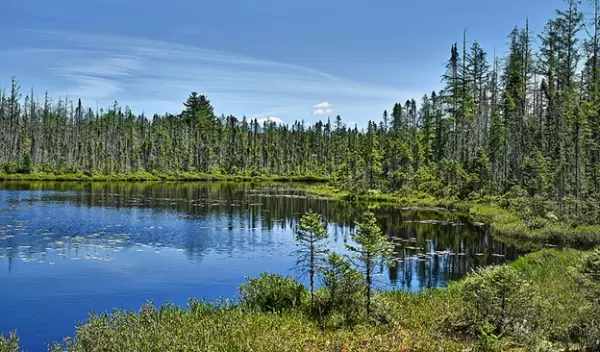
Even modest climate change may dramatically alter Earth's northernmost forests
Even relatively modest climate warming and associated precipitation shifts may dramatically alter Earth's northernmost forests. The woodlands constitute one of the planet's largest nearly intact forested ecosystems and are home to a big chunk of the planet's terrestrial carbon.
That's the main finding from a U.S. National Science Foundation-supported experiment led by University of Minnesota and University of Michigan ecologist Peter Reich and his colleagues. The study used infrared lamps and soil heating cables to study the projected impacts of near-term climate change on thousands of seedlings from nine tree species found in far-northern forests, which are known as boreal forests.
"This study shows that changing climates can affect species in many unexpected ways," said Sam Scheiner, a program director in NSF's Division of Environmental Biology. "Such varied responses make it difficult to predict the effects of the rapid changes in climate we are now experiencing."
North America's boreal forests contain mostly conifers such as spruce, fir and pine. They’re found mainly in Canada and Alaska, but also occur in parts of northeastern Minnesota, a tiny bit of Michigan's Upper Peninsula, and northern Maine. Boreal forests are bounded on the north by tundra and on the south by temperate forests.
In the experiment, young trees at two forest sites in northeastern Minnesota were warmed around the clock, from early spring to late fall, in the open air without the use of greenhouses or growth chambers. Two levels of potential 21st-century climate warming were used: roughly 1.6 degrees Celsius (about 2.9 degrees Fahrenheit) and roughly 3.1 C (about 5.6 F) above ambient temperatures.
The study found that even modest (1.6 C) climate warming produced major problems for many species, including reduced growth and increased mortality. In addition, reduced rainfall amplified the negative effects of warming on the survival of several boreal species.
"Our results spell problems for the health and diversity of future regional forests," said Reich, lead author of the study published in the journal Nature. "Present-day southern boreal forests may reach a tipping point with even modest climate warming, resulting in a major compositional shift with potential adverse impacts on the health and diversity of regional forests.
"Those impacts could reduce the capacity of our forests to produce timber, to host other plant, microbial and animal diversity, to dampen flooding, and — perhaps most important of all — to scrub carbon out of the air and hold it in wood and soil."


